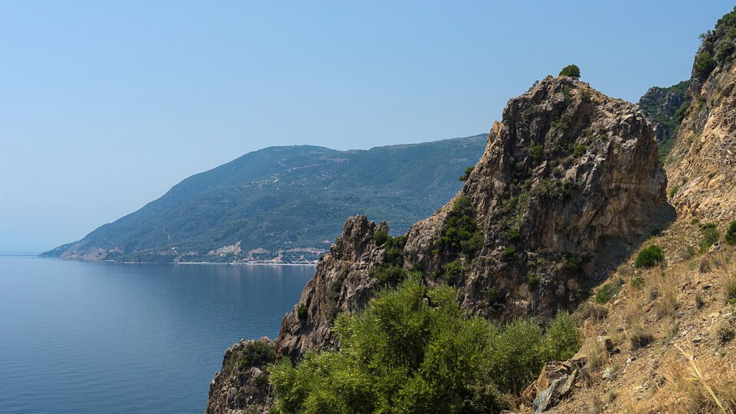Is There A Tsunami Warning After the Athens Greece Earthquake Today? Here's What We Know
Authorities Confirm No Tsunami Threat After Strong Quake Rattles Evia And Athens, Though Aftershocks And Minor Disruption Continue

A strong earthquake struck near the Greek island of Evia in the early hours of 10 September 2025, rattling areas as far as Athens, but officials have confirmed that no tsunami warning has been issued.
The 5.2 magnitude earthquake occurred at 12:27 a.m. local time, with its epicentre located approximately 5 km northwest of Nea Styra, on the southern part of Evia island. The tremor was strong enough to be felt as far as Athens, around 50 km away, according to data from Greece's Institute of Geodynamics.
Seismologists were quick to note that this region is not typically associated with stronger seismic events. Based on historical and instrumental data, the area is considered moderately active but not known for generating powerful quakes. Despite this, the strength and duration of the tremor caused unease among locals.
Residents React as Tremors Felt Across a Wide Area
The shaking led some residents of Nea Styra to spend the night outside, fearing further seismic activity. One local told state broadcaster ERT that it was the strongest earthquake they had ever felt in the area. Others reported that the tremor lasted longer than expected, adding to their concern.
The earthquake was even caught on live television. During a political programme on ERT, the cameras were seen visibly shaking for approximately 30 seconds, as the hosts acknowledged the ongoing tremor in real time.
@abovethenormnews 🚨 Magnitude 5.2 Earthquake Near Athens, Greece 🇬🇷⚠️ At 12:27 am local time on September 9, a strong magnitude 5.2 earthquake struck just 5 km (3 mi) west-northwest of Nea Styra at a shallow depth of 13.6 km (8 mi). The epicenter was only 44 km (28 mi) from Athens. The shallow depth made the shaking intense across Attica and beyond, with many residents jolted awake as buildings swayed through the night. Aftershocks remain possible in the hours ahead. Earthquake Greece Athens BreakingNews AboveTheNormNews
♬ original sound - Above The Norm News - Above The Norm News
In Marathon, located across the South Euboean Gulf, local mayor Stergios Tsirkas confirmed that although the quake was intense, there were no reports of injuries or significant damage. Emergency services were mobilised to assess buildings and infrastructure, though as of this morning, no calls for assistance had been made.
No Tsunami Alert Issued for Athens or Nearby Regions
Despite the earthquake's reach and magnitude, no tsunami warning has been issued. Authorities confirmed that the characteristics of the quake did not meet the requirements for generating a tsunami. Its epicentre was inland and shallow, not beneath the sea, and therefore did not pose a threat of causing significant water displacement.
Athens, located inland on the Greek mainland, is not typically at risk from tsunami events linked to seismic activity. In contrast, areas near undersea fault zones—such as southern Crete or the Dodecanese islands—are more prone to such alerts.
Greece has issued tsunami warnings in the past following undersea earthquakes. On 14 May 2025, a 6.0–6.1 magnitude quake near Kasos and Karpathos led to precautionary tsunami alerts for eastern Crete and Rhodes. However, those warnings were lifted after no tsunami developed.
Aftershocks Continue, But No Major Follow-Up Activity
Seismologist Gerasimos Papadopoulos, chairman of the International Society for the Prevention & Mitigation of Natural Hazards, confirmed that aftershocks continued to occur following the initial quake. The largest measured so far was 2.8 in magnitude, and while stronger ones are possible, none have been reported as dangerous.
Papadopoulos advised residents to remain alert but calm, noting that such sequences of aftershocks are normal following a moderate quake. Authorities are continuing to monitor seismic data in real time to detect any potential changes.
Recent Seismic History in Evia and Crete
Evia, Greece's second-largest island, is no stranger to moderate earthquakes. In May 2025, a 4.5 magnitude quake struck 3 km east of Prokopi, in the northern part of the island. That event damaged over 50 homes, along with several schools and public buildings, highlighting the impact that even mid-sized quakes can have in densely populated areas.
Elsewhere, a 6.1 magnitude quake hit northeast Crete earlier in the year. Though there were no injuries or major damage, authorities temporarily closed tourist sites, including the Samaria and Imbros gorges, as a safety precaution.
While most quakes in the region are moderate, authorities advise residents and tourists in affected areas to follow official updates, particularly in coastal zones.
© Copyright IBTimes 2025. All rights reserved.




















